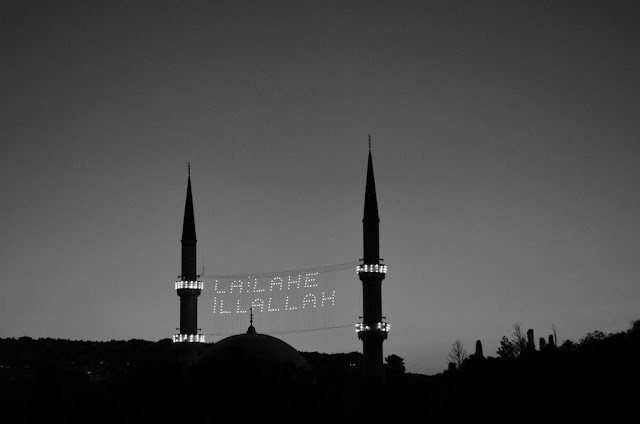Moths and the Mahya
 |
| Eyüp Sultan, Dusk, 18 August 2012 |
There's a lovely post up at the New Yorker talking about a similar experience of fasting [another topic would be the interesting set of discussions in the Comments section about the question of conversion]. Rollo Romig writes of those first ten days:
By Day Ten, the month was, incredibly, passing too quickly. The fast had become much easier; it’s remarkable how the body can adjust to a new pattern. Some days I felt almost disappointingly normal. Fasting is an essentially solitary act; it’s said that it’s the only Islamic practice that’s invisible to an observer. Only God knows if you’re actually sticking with it.And he closes with two marvelous paragraphs:
This essay has made hardly any mention of God, when God is supposed to be the focus and purpose of all this abstention. God, to me, has always been elusive. I understand perfectly why atheists are baffled by religion, but I’m just as baffled by them; I could never claim such certainty about the workings of the universe as to rule out any possibility of God. Faith is misunderstood as a synonym for certitude, but really it’s a concept that has doubt folded into it. My own uncertainty about how to conceive of God is deep. As this month of dawns and sunsets neared its end, I began to wonder if the fast has something to do with God’s very unknowability.
Wherever they are, Muslims direct their prayers toward the Kaaba, the black cube at the center of the Grand Mosque in Mecca, which Muslims also circumambulate when they make their major pilgrimage. Inside, the Kaaba is empty. When the fast empties you out during Ramadan, no matter how well you adjust to the deprivation, you never stop feeling the tug of hunger. That tug is a reminder—a reminder, perhaps, of that void inside the Kaaba, and the silent mystery of the divine. On Day Twenty-seven, I happened upon a verse in the Koran about a mirage in the desert: “The thirsty man takes it to be water until he comes to it and finds it to be nothing, and where he thought it to be, there he finds God."That testament of faith -- the one strung on mahya between the minarets of Eyüp Sultan -- might be translated as, "There is no god but God." I was reading Annemarie Schimmel last night as I filled my hours before sahur and happened across a fascinating passage that's worth quoting at length. She writes:
Nathan Söberblom once defined the use of the negation in the 'prophetic' and the 'mystical' type of religion: the 'prophetic No' is exclusive, as is the lâ ilâha illâ 'Llâh in the shahâda: 'No deity save God'; and whatever is against this absolute truth is dangerous, prohibited, [and] sinful... The 'mystical No', on the other hand, is inclusive, and that is expressed in the transformation of the shahâda into the words, lâ maujûda illâ Allâh, 'there is nothing existent but God', who includes everything. ["How to Approach Islam," in Deciphering the Signs of God]One of the things I've come to think a good deal about is the way that faith comes to matter -- in a semantic sense, but also in a material sense. The things that provide us a way to engage with something that by its very definition is immaterial. In that way, we might see the mayha, this thin strand of light, as one way of realizing the profession of faith in the world. But Schimmel, quoting Rumi, has an interesting response to the role of signs -- the matter of the world:
If there were any animal like the moth that could do without the light of the candle and would not cast itself into the light, it would not be a real moth, and if the moth should cast itself into the candle's light and the candle did not burn it, that would not be a true candle.
Therefore the human being who can live without God and does not undertake any effort is not a human being; but if one could comprehend God, then that would not be God. That is the true human being: the one who never rests from striving and who wanders without rest and without end around the light of God's beauty and majesty.Light and sunset and the mosque. A month passed and a world ahead. Wishing everyone a healthy and happy bayram.
Comments